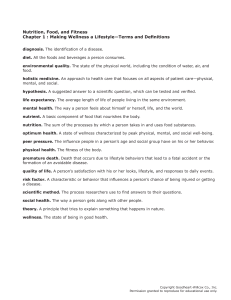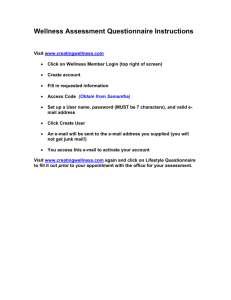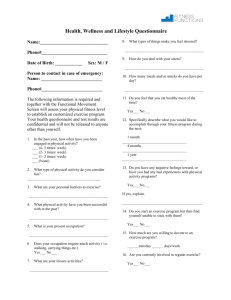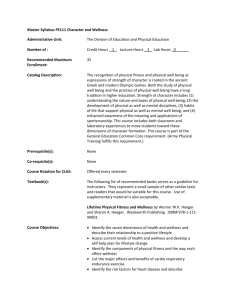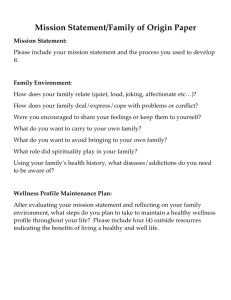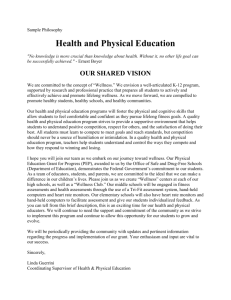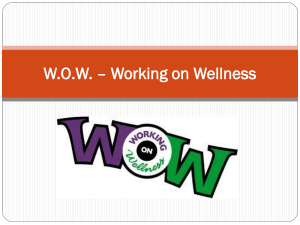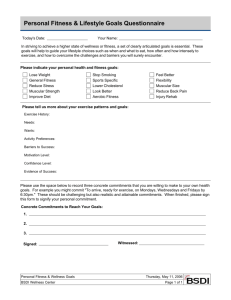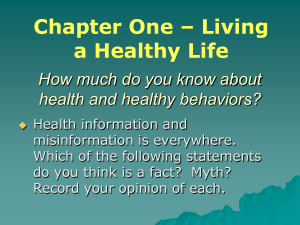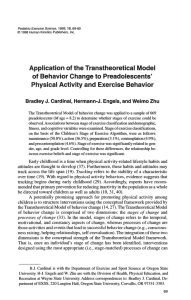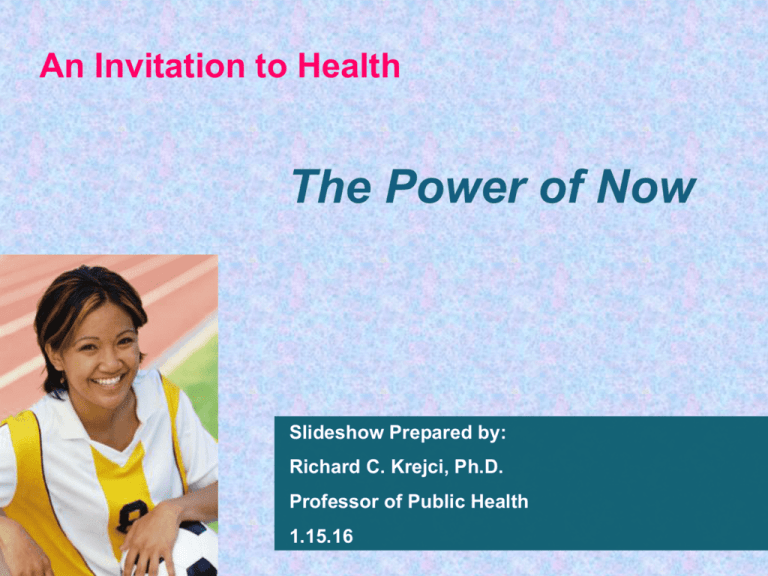
An Invitation to Health
The Power of Now
Slideshow Prepared by:
Richard C. Krejci, Ph.D.
Professor of Public Health
1.15.16
Chapter Objectives
Define health and wellness. http://eatocracy.cnn.com/2013/01/28/gatoraderemoves-controversial-ingredient-after-girls-online-petition/
Identify each of the six dimensions of
health and describe how they relate
to total wellness.
Describe how poverty, race,
and gender contribute to health
disparities in the U.S.
List guidelines for evaluating websites
that provide health information.
Outline the national health objectives in
Healthy People 2020.
Describe the five stages in the transtheoretical model of
change and apply it to a lifestyle behavior you want to
change.
Why Learn More About Personal and
Public Health?
•
The American Health Care System is broken.
http://www.indiegogo.com/projects/escape-fire-the-fight-to-rescue-american-healthcare—4
•
We do not have a health care system – we have a disease
management system
•
Today, we are not even in the top 20 countries in the world for live
expectancy
•
Medical costs are totally out of control
•
We are mortgaging our future as we spend far too much on medical
care.
•
The key is education, awareness, promotion of healthy lifestyles, and
prevention of chronic diseases and conditions.
•
This is why a course similar to PUBH 261 exists in most colleges and universities.
Health and Wellness
Health
Wellness
•
Purposeful, enjoyable
living or lifestyle.
•
A deliberate lifestyle
•
choice characterized by
personal responsibility
and optimal enhancement
of physical, mental, and
spiritual health.
“Process”
•
Being sound in body,
mind, and spirit.
Not merely the absence
of disease or infirmity, but
a state of complete
physical, mental, and
social well-being.
“Product”
Create Your Definition Of Health
Some characteristics of health
•
Positive, optimistic outlook
Sense of control, able to relax
• Energy and vitality
• Supportive social network
• Personally satisfying job or endeavor
•
How do you define being of sound of body, mind
and spirit?
Three Major Areas Of Health
Disparity
Primary reason for minority health
Income disparities is poverty
Level
Race
Poor receive worse care
Dramatic differences in disease, death
rates and injury between races
May have greater impact than any other
variable
Sex/
Gender Biological, social, behavioral factors and
health habits differ between sexes
The Integration of the Six
Dimensions of Health
PHYSICAL
SOCIAL
SPIRITUAL
PERSONAL
HEALTH
PSYCHOLOGICALL
ENVIRONMENTAL
INTELLECTUAL
Integration of health dimensions means that each dimension will have a direct (or indirect)
impact on others. It is impossible for one to reach a high level of personal health without
giving full consideration to each dimension.
From: Hoeger and Hoeger. Lifetime Physical Fitness and Wellness, 9th Edition, Thompson/Wadsworth, 2007.
The Six Dimensions of Health
Physical
Health
Good physical fitness and
confidence in one’s personal ability
to take care of health problems.
Spiritual
Health
Having a purpose for life; learn how
to experience love, joy, peace, and
fulfillment; experience altruism.
The Six Dimensions of Health
Environmental The impact your world has on your
Health
well-being –protection and
preservation.
Intellectual
Health
The ability to think and learn from
life experiences; be open to new
ideas; and to question and evaluate
information.
The Six Dimensions of Health
Psychological Psychological health refers to both
Health
our emotional and mental states –
that is, to our feelings and our
thoughts.
Social Health
The ability to interact effectively
with other people and the social
environment, to develop satisfying
interpersonal relationships, and to
fulfill social roles.
The Wellness-Illness Continuum
Premature
death
Illness
Neglict
Symptoms
Average
health
Emotional
growth
Optimal health
Zest and wellness
for life
Education/Awareness
Healthy People 2020
Every decade the Federal Government identifies the
most significant preventable threats to health and
creates leading indicators that assess the health of
Americans.
• Healthy People 2020 is the prevention agenda for the
nation.
1st Goal
To help individuals of all ages increase life expectancy and
improve their quality of life.
2nd Goal
To eliminate health disparities among different segments
of the population.
•
Specific Goals of Healthy People 2020
Reduce the Prevalence of Cigarette Smoking
Reduce the Number of New Cancer Cases
Promote the Health of People with Disabilities
Reduce Foodborne Illnesses
Reduce the Proportion of Obese Children
Reduce the Use of Illegal Substances
Reduce the Incidence of Binge Drinking
Image taken from Brown, Thomas, and Kotecki, Physical
Actiivity and Health: An Interactive Approach, 1st Edition,
2002.
Photo taken from Fahey, TD, Insel, PM, and Roth,
WT, Fit and Well: Core Concepts and Labs,
McGraw-Hill, 5th edition, 2002.
New Recommendations for 2020
•
Prevent inappropriate weight gain
•
Increase smoking cessation success
•
Reduce the incidence of STDs
•
Reduce the misuse of prescription drugs
•
Increase cardiovascular health and fitness
•
Reduce sports and recreation
injuries.
Preventing Health Problems &
Staying Healthy
•
Prevention
•
•
Protection
•
•
Information and support offered to help healthy people identify
their health risks, reduce stressors, prevent potential medical
problems, and enhance their well-being.
Measures that an individual can take when participating in risky
behavior or prevent injury and unwanted risks.
Understanding the Behaviors That Carry High Risks
Medical Claims Can Be Misleading
Evaluate claims by asking questions: Dr. Oz
Who are the scientists involved?
Where did they report their findings?
Is information a testimonial?
Are ‘amazing, secret, or quick’ used?
Are they trying to sell something?
How Do Undergraduate Students
Rate Their Health?
Are women less healthy or are they more critical of
their health?
Health-Related Impediments to
Academic Performance
How are Males and Females Different?
75.2
80.4
Fig 1.1
Pg. 10
Evaluate Health Websites
Who created it?
Student Health 101
When was it last updated?
Are there references?
Is the author qualified?
Is there a potential bias?
Does Race Affect One’s Health Risk?
African
Americans
Infant Mortality
Rate
↑
Life Expectancy
-5 years
High Blood
Pressure
↑
Cancer (colon,
rectal and
prostate)
↑
Whites
Native
Americans
↑
Late Stage Breast
Cancer
Diabetes
Women of Filipino,
Hawaiian, Indian,
Pakistani, Mexican,
South and Central
American and Puerto
Rican Descent
↑
Eye complications
of diabetes
Osteoporosis,
cystic fibrosis,
skin cancer, and
PKU
Latinos
Living in
the U.S.
↑
↑
The Top 10 Leading Causes of Death
by Race
What are some of the similarities? Major differences?
What Can I Do to Improve My Health If My
Racial Background Puts Me at Risk?
•
Know as much as you can about your family’s medical history.
•
Ask if you are at risk for any medical conditions or disorders
based on your family history, racial, or ethnic background.
•
Find out if there are screening tests that could determine your
risks.
•
Ask what steps you can take that may lower your vulnerability
to disease.
•
Bring someone else with you for support and to
help you remember what you learn.
Factors That Shape Positive
Behaviors
Predisposing
Factors
•
Knowledge
•
Attitudes
•
Beliefs
•
Values
•
Perceptions
Positive Change in
Health Behaviors
Incorporates Reinforcing
Enabling
Factors
•
Skills
•
Resources
•
Facilities
•
Physical
capabilities
•
Mental
capabilities
•
•
•
•
•
Factors
Praise from others
Rewards
Encouragement
Recognition
Sense of
achievement
Fig 1.2 Page 16
The Transtheoretical Model of Change
Stages of
Change
Processes
of Change
SelfEfficacy
Copyright ©
James Prochaska
Positive Behaviors to Adopt
Independent Exerciser
Choose Healthy Foods
Weight Control
Manage Stress
Medical Check-ups
Personal Safety Awareness
Learn First Aid/CPR Skills
Healthy Relationships/Safe Sex
Environmental Sensitivity
Photo taken from Concepts of Fitness and Wellness by Corbin, Welk and Lindsey, McGraw-Hill Publishers, 2003.
Negative Behaviors to Eliminate
Use of Tobacco Products
High Fat/Cholesterol Diet
Sugar Dominated
Foods/Beverages
Alcohol Abuse
Drug Abuse
Over-exposure to the Sun
Worry/Procrastination
Sedentary Lifestyle
Transtheoretical Model: The Six Stages
of Lifestyle Change
Adoption
Maintenance
Often after two to five years
behaviors can become so
deeply ingrained that a person
cannot imagine abandoning it.
Individuals have continued to
work at changing their behavior
and have avoided relapse for at
least six months.
Action
Point of Behavior change
Preparation
Contemplation
Precontemplation
Individuals are modifying their
behavior according to their plan but
not consistently.
Individuals intend to change a problem
behavior within the next month.
Individuals are aware they have a problem
behavior and are considering changing within
the next six months.
Individuals have no intentions of making a change in
the next six months.
The Transtheoretical Model can be a
Model of Progression or a Model of
Relapse Prevention
The Stages of Change and
the Change Processes that Apply
Precontemplation Contemplation Preparation
Action
Maintenance
Termination
Consciousness raising
Social liberation
Emotional arousal
Self-reevaluation
Commitment
Rewards
Countering
Environmental control
Helping relationships
Fig. 1-3, p. 22
Steps for Modifying a Health Behavior
1. Identify area of change and behavior to modify.
2. Write a “SMART” long-term goal.
3. Determine your current stage of change.
4. Select a process relevant to the stage of change.
5. Develop a specific plan of action.
6. Determine a strategy for positive reinforcement.
7. Examine all possible resources as part of your
support network.
“SMART” Goal Setting
To initiate a change in behavior, well-written goals
are essential. Written goals should be:
•
•
•
•
•
Specific short- term and long term
Measurable
Acceptable
Realistic
Time-specific
Self-Efficacy and Locus of Control
Locus of Control
The sense of being
in control of your life.
Self-Efficacy
The belief in your ability to change
and cope with challenge.
The End
Slideshow was developed by:
Richard C. Krejci, Ph.D.
Professor of Public Health
Columbia College
All Rights Reserved

